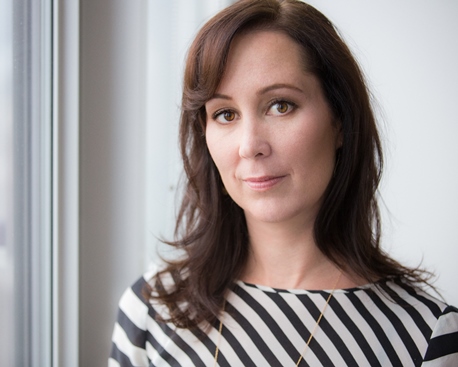BuzzFeed Content Practice: Illegal or Simply Unethical? – Nancy Galanty, MyersBizNet

On a recent Friday evening I published a photo of my two daughters (ages 9 and 7) to my Instagram account, where I have a nominal count of 171 followers, all family and friends. The following Sunday morning, I was alerted by email from a teacher at my daughters’ school that their photo had been distributed to BuzzFeed’s audience of 130 million in a feature article titled “21 Questions You're Afraid to Ask Your Friends with Kids,” a collection of humorous questions and answers typical of BuzzFeed’s content.
The photo of my daughters was prominently included in the feature’s 17th question, “If you have more than one, will you love them both equally?” Thirteen of the 21 images used in the BuzzFeed feature, like mine, are photos of minors sourced from personal Instagram accounts. The photo of my daughters was published by BuzzFeed without my knowledge or consent.
While the primary use of my Instagram account is to share family photos with relatives and friends, my account was public. (Lesson learned; I’ve since privatized it, and if yours is public, make it private now!) I intentionally chose the public Instagram account setting because I like the photo discovery ability with common tags and the ability to find and follow photographers whose photos I enjoy. I did a quick scan of Instagram’s privacy policy when joining the site and felt comfortable enough with its terms. I understood that posting my content publicly meant other Instagram users could “search for, see, use or share” my content. I naively assumed “use” did not mean wide scale distribution of a photo of minors by a major digital publisher. And this is where ethics and safety begin to complicate the question, “Who owns user-generated social content?”
I shared my experience Sunday morning with my Facebook community. I asked for thoughts from both parents and media professionals. Not surprisingly, the response among my community of parents was that BuzzFeed’s practice is “creepy,” “crazy,” “unethical” and “unsafe.” I agree completely. In publishing my photo along with my Instagram account information, BuzzFeed provided access to my name, my daughters’ names, our geographic location and our favorite places to frequent. I am more than comfortable sharing that information with my small group of Instagram followers. I am in no way comfortable sharing that information with BuzzFeed’s far larger audience, and I expect all of the other parents whose family photos are used without their knowledge by BuzzFeed would be equally uncomfortable.
The response from the media community was confused at best. With comments from executives at Facebook, DigitasLBi, BlastPR, DuJour Media Group and a digital marketing lead at a major brand, no one could answer definitively whether or not BuzzFeed had crossed a legal line or merely an ethical one. Most believed my public account provided BuzzFeed “fair” access to repurpose my photos. Others believed the use of minors in the photo further complicated ownership and republication rights. One went so far as to say if it were a photo of his children, he would sue.
I’ve since re-read Instagram’s privacy policy and do believe it gives BuzzFeed legal rights to my photo. I’ve also re-read Instagram’s privacy policy in regard to children under the age of 13. It is largely focused on prohibited use of Instagram for children under the age of 13 and prohibited data collection of children under 13. But, it does not clearly address ownership or republication rights of photos of children under 13.
I immediately sent an email to BuzzFeed asking them to remove the photo of my daughters from their content feature -- and I received no response from my initial outreach. In advance of publishing this post, I made contact with a Buzzfeed Vice President, who facilitated the removal of the photo. I found his response revealing because he also claimed not to know whether or not Buzzfeed’s publishing practice is legal or not. “I'm not a lawyer, but my understanding is that according to Instagram terms of service the photos are in the public domain (again, I'm not a lawyer),” he wrote.
It’s also worth noting that most people don’t have easy access to BuzzFeed executives or an industry relationship that encourages them to pay attention and respond. Had I not had this access, the photo of my daughters would most likely have continued to accompany BuzzFeed’s Question #17 into eternity.
What are your opinions on the legal and ethical responsibilities of BuzzFeed, Instagram and other social media, especially when it relates to photos of minors and potential access to their identities? Consumers’ rights and ownership of social content are complex issues; the industry should consider them and set standards before a tragedy brings them into the forefront of public attention.
With over 15 years of experience developing global marketing and content strategies, Nancy Galanty is Vice President, Community Development at MyersBizNet. She oversees the strategic growth of the Women in Media Mentorship Initiative (WIMMI), Media Legends and MediaVillage.
Galanty is Vice President, Community Development at MyersBizNet. She oversees the strategic growth of the Women in Media Mentorship Initiative (WIMMI), Media Legends and MediaVillage.
Check us out on Facebook at MediaBizBloggers.com
Follow our Twitter updates at @MediaBizBlogger
The opinions and points of view expressed in this commentary are exclusively the views of the author and do not necessarily represent the views of MediaBizBloggers.com management or associated bloggers. MediaBizBloggers is an open thought leadership platform and readers may share their comments and opinions in response to all commentaries.


